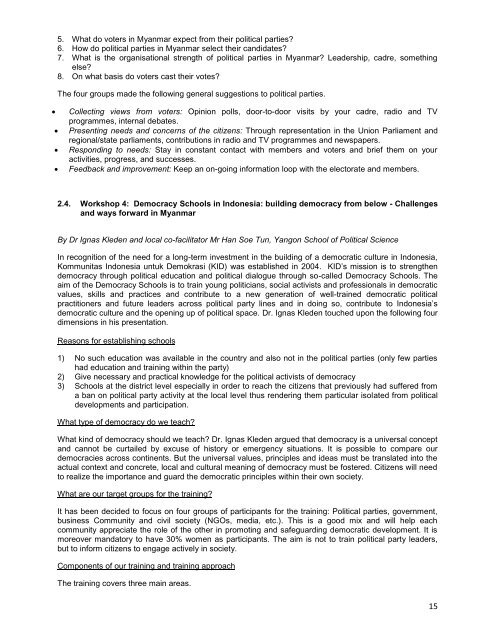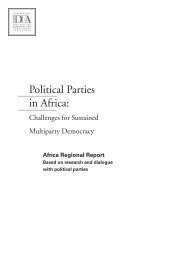Seminar Report The role of Political Parties in Democratic Transitions
Seminar Report The role of Political Parties in Democratic Transitions
Seminar Report The role of Political Parties in Democratic Transitions
You also want an ePaper? Increase the reach of your titles
YUMPU automatically turns print PDFs into web optimized ePapers that Google loves.
5. What do voters <strong>in</strong> Myanmar expect from their political parties?<br />
6. How do political parties <strong>in</strong> Myanmar select their candidates?<br />
7. What is the organisational strength <strong>of</strong> political parties <strong>in</strong> Myanmar? Leadership, cadre, someth<strong>in</strong>g<br />
else?<br />
8. On what basis do voters cast their votes?<br />
<strong>The</strong> four groups made the follow<strong>in</strong>g general suggestions to political parties.<br />
Collect<strong>in</strong>g views from voters: Op<strong>in</strong>ion polls, door-to-door visits by your cadre, radio and TV<br />
programmes, <strong>in</strong>ternal debates.<br />
Present<strong>in</strong>g needs and concerns <strong>of</strong> the citizens: Through representation <strong>in</strong> the Union Parliament and<br />
regional/state parliaments, contributions <strong>in</strong> radio and TV programmes and newspapers.<br />
Respond<strong>in</strong>g to needs: Stay <strong>in</strong> constant contact with members and voters and brief them on your<br />
activities, progress, and successes.<br />
Feedback and improvement: Keep an on-go<strong>in</strong>g <strong>in</strong>formation loop with the electorate and members.<br />
2.4. Workshop 4: Democracy Schools <strong>in</strong> Indonesia: build<strong>in</strong>g democracy from below - Challenges<br />
and ways forward <strong>in</strong> Myanmar<br />
By Dr Ignas Kleden and local co-facilitator Mr Han Soe Tun, Yangon School <strong>of</strong> <strong>Political</strong> Science<br />
In recognition <strong>of</strong> the need for a long-term <strong>in</strong>vestment <strong>in</strong> the build<strong>in</strong>g <strong>of</strong> a democratic culture <strong>in</strong> Indonesia,<br />
Kommunitas Indonesia untuk Demokrasi (KID) was established <strong>in</strong> 2004. KID’s mission is to strengthen<br />
democracy through political education and political dialogue through so-called Democracy Schools. <strong>The</strong><br />
aim <strong>of</strong> the Democracy Schools is to tra<strong>in</strong> young politicians, social activists and pr<strong>of</strong>essionals <strong>in</strong> democratic<br />
values, skills and practices and contribute to a new generation <strong>of</strong> well-tra<strong>in</strong>ed democratic political<br />
practitioners and future leaders across political party l<strong>in</strong>es and <strong>in</strong> do<strong>in</strong>g so, contribute to Indonesia’s<br />
democratic culture and the open<strong>in</strong>g up <strong>of</strong> political space. Dr. Ignas Kleden touched upon the follow<strong>in</strong>g four<br />
dimensions <strong>in</strong> his presentation.<br />
Reasons for establish<strong>in</strong>g schools<br />
1) No such education was available <strong>in</strong> the country and also not <strong>in</strong> the political parties (only few parties<br />
had education and tra<strong>in</strong><strong>in</strong>g with<strong>in</strong> the party)<br />
2) Give necessary and practical knowledge for the political activists <strong>of</strong> democracy<br />
3) Schools at the district level especially <strong>in</strong> order to reach the citizens that previously had suffered from<br />
a ban on political party activity at the local level thus render<strong>in</strong>g them particular isolated from political<br />
developments and participation.<br />
What type <strong>of</strong> democracy do we teach?<br />
What k<strong>in</strong>d <strong>of</strong> democracy should we teach? Dr. Ignas Kleden argued that democracy is a universal concept<br />
and cannot be curtailed by excuse <strong>of</strong> history or emergency situations. It is possible to compare our<br />
democracies across cont<strong>in</strong>ents. But the universal values, pr<strong>in</strong>ciples and ideas must be translated <strong>in</strong>to the<br />
actual context and concrete, local and cultural mean<strong>in</strong>g <strong>of</strong> democracy must be fostered. Citizens will need<br />
to realize the importance and guard the democratic pr<strong>in</strong>ciples with<strong>in</strong> their own society.<br />
What are our target groups for the tra<strong>in</strong><strong>in</strong>g?<br />
It has been decided to focus on four groups <strong>of</strong> participants for the tra<strong>in</strong><strong>in</strong>g: <strong>Political</strong> parties, government,<br />
bus<strong>in</strong>ess Community and civil society (NGOs, media, etc.). This is a good mix and will help each<br />
community appreciate the <strong>role</strong> <strong>of</strong> the other <strong>in</strong> promot<strong>in</strong>g and safeguard<strong>in</strong>g democratic development. It is<br />
moreover mandatory to have 30% women as participants. <strong>The</strong> aim is not to tra<strong>in</strong> political party leaders,<br />
but to <strong>in</strong>form citizens to engage actively <strong>in</strong> society.<br />
Components <strong>of</strong> our tra<strong>in</strong><strong>in</strong>g and tra<strong>in</strong><strong>in</strong>g approach<br />
<strong>The</strong> tra<strong>in</strong><strong>in</strong>g covers three ma<strong>in</strong> areas.<br />
15
















